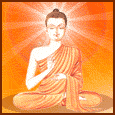|
HINDU GOD - BUDDHA
THE ENLIGHTENED
The Buddha's relation with Hinduism
is so close that it's easy to confuse
Buddhism with Hinduism. The two
religions have close connections, and
yet they are distinct. This was because
of Buddha's reform movements and his
refining of Hindu beliefs. It would not
be wrong to state, then, that Buddha
founded a noble religion by distilling
Hinduism, and offering a commonsense
approach to self-betterment to which the
people can relate easily. Buddha, as
we know, began his meditation as a Hindu. He was awakened
with a new enlightenment only to denounce Hinduism and
emerge as the founder of a new religion. Therefore, to
understand Buddhism fully, one should not separate it from
Hinduism; while at the same time view it separately from
Hinduism. Buddha's way of life was "the golden mean" and a
relief from the pagan stigmas and caste system prevalent in
Hinduism. The Hindu caste system defined a person's
position in society as determined by their birth. Buddha
condemned the caste system and said that it is karma or the
good and bad actions of a person and not birth that should
determine a person's status. He introduced the idea of
placing morality and equality on a higher place than
genealogy of a person. |

WORLD RELIGIONS
COMPARED
WORLD
RELIGIONS CLIPART
WORLD
RELIGIONS HOME
HINDUISM HOME
HINDU GODS
VISHNU'S AVATARS |
Swami Kriyananda compares Buddha's position relative
to Hinduism with Martin Luther's to the Roman Catholic Church: "Both
men were reformers, and the structure reformed by each was not
supplanted by his teachings. The Catholic Church survives to this
day, and has in many ways been strengthened by Luther's reforms.
Hinduism similarly was purified and strengthened by the teachings of
Buddha, and was in no way replaced by them. Most Hindus today look
upon Buddha as one of their own Avatars or Divine Incarnations."
Hindus believe that the purpose of the avatar of
Buddha, like all divine avatars, was to re-establish dharma where "adharma"
(irreligiousness) had become prevalent. Buddha is regarded by some
sects of Hindus as an incarnation of Vishnu, or even as a Hindu.
This is because Buddha's theistic beliefs are not contrary to
Hinduism, but only a step ahead. This is also because the nature of
Hinduism itself is such that all beliefs are recognized as being
facets of the Ultimate Truth. It is interesting to note that the
word "Nirvana" — used by Lord Buddha to describe the state of
permanent bliss — is indeed a Vedic term.
The great unification of Buddhism and Hinduism is still prevalent in
Nepal, the birthplace of Buddha. Ironically, Nepal is the world's
only Hindu nation, where people don't consider the two religions
distinct from each other.
Truth is one; sages call it
by different names.
Hindu Proverb
Y